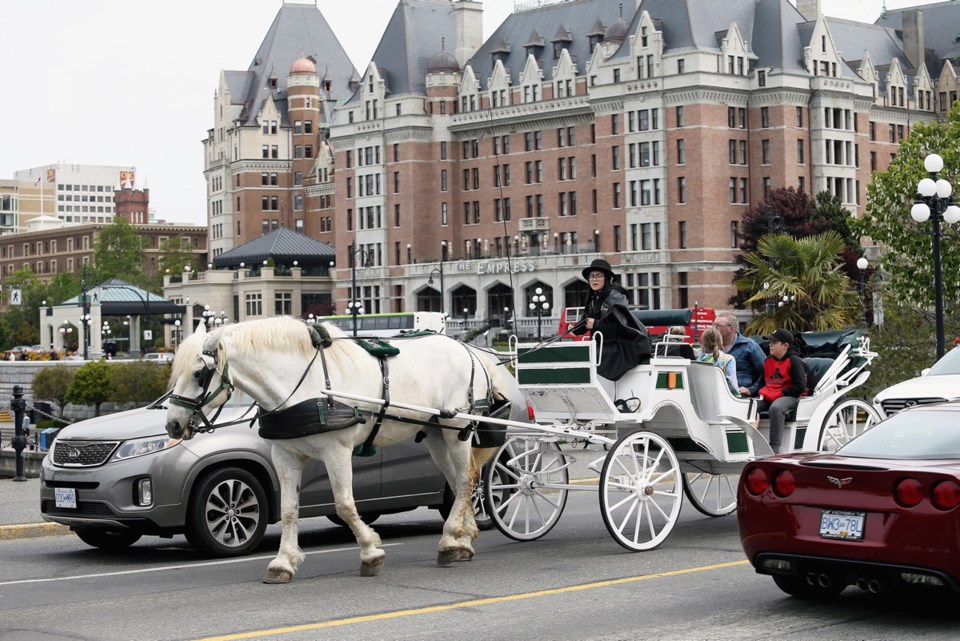Victoria council has delayed a decision on whether to ban horse-drawn carriages from city streets.
Councillors voted at a committee of the whole meeting Thursday to put the debate on hold while staff investigate implications of such a move. A report is expected at council’s next quarterly update in September.
Council will decide at that point whether to amend its strategic plan to include banning the carriages. Coun. Ben Isitt, who put forward the motion, wants the city to develop regulations next year to phase out horse-drawn carriages by 2023. He cited rising temperatures and worsening traffic congestion among reasons for getting rid of the carriages.
“I think the conditions environmentally, the conditions in this built-up city only getting more congested on our roads, [mean that] it is time to look at a regulatory change,” he said Thursday.
His motion calls for the city to work with industry and others to pursue “innovation in electric-powered vehicles for hire” to provide opportunities for “experiential tourism.”
Mayor Lisa Helps opposed asking for a staff report on the issue, saying there are more pressing matters. She said council spent considerable time developing its strategic plan and no new information has surfaced that justifies tackling horse-drawn carriages.
Helps said the community is deeply divided on the issue and she voiced concern that it will take time and energy away from other priorities, such as improving housing affordability and fighting climate change. “We are in a climate emergency,” she said. “We’re not in a horse emergency. And I really think we need to focus our efforts there.
“I know there are lots of merits for phasing out the horses and lots of merits for keeping the horses, and I think that’s a debate that can be put forward to a future council once we have sorted out the housing crisis and gotten a grip on what we can do to stop climate change.”
Isitt, however, said he believed the issue could be resolved without extensive public-engagement. “I agree 100 per cent with the mayor that there are much bigger priorities for public engagement and also for municipal resources,” he said.
“I view this as a housekeeping matter that is overdue, frankly.”
Donna Friedlander, owner of Tally-Ho Carriage Tours, said the council motion ignores third-party evidence and widespread public opinion in support of the carriage industry.
“I really am disappointed that certain members of council choose to put forward their own personal agenda ahead of what is actually in the best interests of taxpayers, and what taxpayers have told them is in their best interests,” she said. “The public is extremely passionate about their horses in downtown Victoria.”
Friedlander, who speaks for the carriage industry in Victoria, said Isitt’s motion threatens the livelihood of her staff and horses. “And I care very deeply about both,” she said. “You don’t take a horse with a 20-year lifespan ahead of it and just decide that it becomes irrelevant. These are live animals and they are owed more respect and consideration than what these council members have given them.”
Last year, a video of two harnessed horses struggling to find their footing, after they ended up lying on the pavement when the carriage they were pulling was bumped by a bus, prompted the SPCA to call for a ban on carriage operations. However, in a subsequent letter, B.C. SPCA CEO Craig Daniell said his organization would welcome “a solutions-based policy approach that reviews existing practices, barriers and opportunities for horse-carriage operation.”
Erika Paul, SPCA animal protection and outreach officer, said her organization is no longer calling for a ban. “Whether council decides to phase them out, it’s entirely up to them. If they decide to keep them on the streets, to keep them working, then we would like some policies or operational procedures in place to ensure the safety of the horses.”
— with a file from Bill Cleverley



